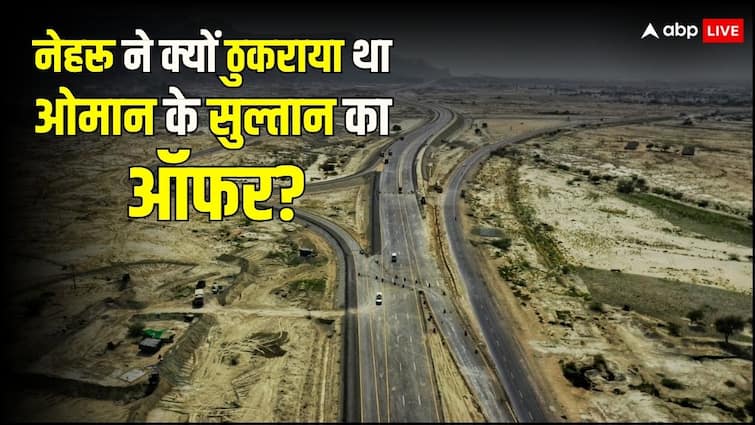Gwadar, the port city of Balochistan province, is a valuable city of Pakistan today. This is an important part of the CPEC project of China and Pakistan. If the then Prime Minister Pandit Jawaharlal Nehru had accepted the offer of the Sultan of Oman in 1956, this city would have been a part of India today. Many experts consider this decision of Pandit Jawahar Lal Nehru as a big mistake like Katchatheevu Island.
Gwadar was ruled by Oman for 200 years, but in 1956, the Sultan of Oman wanted to sell it to India and he proposed it to the Indian government. Pandit Jawaharlal Nehru did not accept it keeping various reasons in mind and in 1958 the Sultan of Oman sold this city to Pakistan. Retired Gurmeet Kanwal, while mentioning this incident in an opinion piece ‘The Historic Blunder of India No One Talks About’ in 2016, has called it a big mistake of Pandit Jawahar Lal Nehru. He said that it was a big mistake of the former Prime Minister not to accept this priceless gift from the Sultan of Oman.
Why did the Sultan of Oman want to sell Gwadar to India?
National Security Advisory Board member Pramit Pal Chaudhary said that there were good relations between India and Oman, hence after independence, Gwadar was looked after by the Indian administration. Due to good relations with India, in the year 1956, Oman offered to sell Gwadar to Pandit Jawaharlal Nehru, but he did not accept it. Two years later, in 1958, Oman gave it to Pakistan for 3 million pounds.
Azhar Ahmed, a historian, told in ‘Gwadar: A Historic Kaleidoscope’ that in some documents of the British government, it is also mentioned that the Jain community of India was also offered to sell Gwadar. Jains were a very wealthy community and the Sultan of Oman believed that a good amount of money could be earned from them. When Pakistan got wind of this, it intensified its efforts to buy Gwadar and was successful in it.
Why did Nehru not accept Gwadar offer?
The circumstances of that time were also responsible for why Pandit Jawahar Lal Nehru did not accept the offer of the Sultan of Oman. Pramit Pal Chaudhary told that the then Foreign Secretary Sabimal Dutt and Indian Intelligence Bureau Chief BN Malik had suggested Jawaharlal Nehru not to accept the Sultan’s offer. At that time, relations between India and Pakistan were going through a very delicate phase, hence they did not want any such step to be taken which could spoil the relations further. He believed that if the offer was accepted, it would be like provoking Pakistan without any reason. Nehru was emphasizing on improving relations with Pakistan. There was also an argument that by taking control of Gwadar, India may have to face the same situation as was seen in the eastern part of Pakistan which later separated and became Bangladesh.
What is the history of Gwadar, how did the rule of Oman begin?
If we look at the history of Gwadar, the rule of Oman started on this city in the year 1783. Pramit Pal told that Khan of Kalat Mir Noori Nasir Khan Baloch had gifted Gwadar to Prince Sultan bin Ahmed of Muscat. A mutual understanding was reached between the two Sultans that if the Prince ascended the throne of Oman, he would hand over Gwadar back to the Khan of Kalat.
Sultan bin Ahmed used Gwadar base to attack Arabia. In 1792, he got the throne of Muscat, but he did not return Gwadar to Khan and Kalat, due to which a dispute started between the two. On the other hand, the British government ruling India also wanted to capture Gwadar. Martin Budward told in his article ‘Gwadar: The Sultan’s Possession’ that in 1895 and 1904, the Khan of Kalat and the British government made proposals to the Sultan of Oman regarding Gwadar, but no decision could be taken. Gwadar was under the British government since 1763, but it was not directly ruled by it. The Khan of Kalat was repeatedly demanding the return of Gwadar and the Sultan of Oman was talking about handing over Gwadar to the British to get military and financial help against the rebels.
When India and Pakistan were divided, no decision was taken regarding those princely states, which were under the British Empire, but the British had no direct rule over them. Kalat, Kharan, Los Bula and Makran were the princely states of Balochistan, which took their own internal decisions and were part of the British Empire under some treaties. At the time of partition, they were given the right to merge with either India or Pakistan as per their wish.
Also read:-
India-Maldives: China’s slave Maldives is not going away, now the tricolor is insulted
Be the first to read breaking news in Hindi aajsamacharindia.com| Today’s latest news, live news updates, read most reliable Hindi news website aajsamacharindia.com|
Like us on Facebook or follow us on Twitter for breaking news and live news updates.

